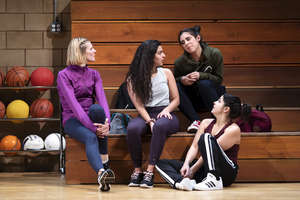Review: HOW TO DEFEND YOURSELF at Victory Gardens Theater

Liliana Padilla's HOW TO DEFEND YOURSELF offers a brilliant examination of collegiate life, and, more specifically, the ways in which rape culture and the entirely real possibility of sexual assault affect university students. But what makes Padilla's play so powerful, fascinating, and entertaining is that their playwriting never becomes preachy or pointed. By capturing the parlance and cadence of the language that college students use with acute accuracy, Padilla allows the expertly fleshed out characters to reflect on these issues in a grounded and compelling manner.
HOW TO DEFEND YOURSELF concerns a group of young women at an unnamed university who come together for a self-defense course in the wake of a brutal sexual assault on campus. Course leader Brandi (Anna Crivelli) holds steadfast in her desire to offer the course to her fellow female-identifying students and to assert her authority in self-defense techniques, though the play never completely reveals precisely why she's so insistent. Her fellow sorority sister Kara (Netta Walker) seems eager to assist Brandi out of a sense of guilt. Freshman attendee Mojdeh (Ariana Mahallati) seems keen on endearing herself to both Brandi and Kara as a potential new member (PNM) of the sorority and to prepare herself for the potential pitfalls of college dating. Mojdeh's fellow freshman Diana (Isa Arciniegas) appears hell-bent on learning to defend herself in the most effective way possible, even if that might include wielding a firearm. The soft-spoken Nikki (Andrea San Miguel) wants to explore the self-defense class as a potential way of forging a connection with other students on campus. Padilla makes the motives of each character clear, even though the characters rightfully do not put all their cards on the table. The self-defense class becomes yet more interesting with the addition of two male participants, fraternity brothers of the young men who assaulted fellow student Susannah.
Through these characters, Padilla demonstrates some of the most potent dichotomies that exist on today's college campuses. These young women come together to learn self-defense and find out how to use their voices in a society that's still largely male-dominated, but they're also concerned with impressing potential friends and dating partners. Padilla's dialogue reveals this beautifully at many points. In one scene, Mojdeh remarks that she wants to find a partner who accepts her for exactly who she is. In the next breath, she advises Diana that if she wants to be recruited into a sorority, she'd better present the "nice" version of herself. These moments expound the complexities of college life and serve as reminders that adolescent development is nowhere near complete by the time students enter university. For the young women and men in the play, college represents an exciting time of self-discovery and freedom, but also a time of immense pressure to conform and abide by a number of outdated college norms.
Under the direction of Martí Lyons, all of the actors portray their roles with the complexity and the rawness that Padilla's script commands. Along with movement director Steph Paul, fight director Matt Hawkins, and intimacy director Rachel Flesher, Lyons's production also incorporates a dynamic sense of physicality and some intriguing movement interludes. Because the play centers on a self-defense course, movement is naturally a critical component of the staging.
Crivelli bestows Brandi with a compelling dual sense of confidence and vulnerability; her Brandi is eager to lead and to help, but she's obviously struggling with her own issues under the surface. Walker likewise gives Kara a tough "cool girl" exterior, while also illuminating how her character is trying to make sense of college and dating life. Arciniegas has one of the most humorous takes as Diana, easily garnering laughs. But her performance also embraces Diana's struggle to search for intimacy and true friendship. Mahallati plays Mojdeh with an effective combination of earnestness and insecurity. Miguel has impeccable timing with her line deliveries as Nikki, demonstrating that her character has a lot more to share than we might first think. Andy (Ryan McBride) embodies the role of the well-intentioned mansplainer, while Eggo (Jayson Lee) wants to gain clarity on exactly what it means to give and receive consent. In Andy, McBride bestows the ideal balance of endearing and annoying onto the role; while Andy does not mean to mansplain the day away, he asserts his white male privilege at almost every turn.
HOW TO DEFEND YOURSELF is an invigorating theatrical experience that opens up compelling perspectives about sexual assault on college campuses and more general questions about identity formation as a university student. Padilla finds a beautiful balance in the play that allows for many humorous moments while never taking the central issues lightly. Victory Gardens could hardly ask for a better cast than the one Lyons has assembled here. HOW TO DEFEND YOURSELF is powerful and energizing, and it's a play that simply demands to be seen right now.
HOW TO DEFEND YOURSELF runs through February 23 at Victory Gardens Theater, 2433 North Lincoln Avenue. Tickets are $31-$65. Visit VictoryGardens.org or call 773.871.3000.
Photo Credit: Liz Lauren
Review by Rachel Weinberg
Comments
.png)
|
.png)
|
Videos

